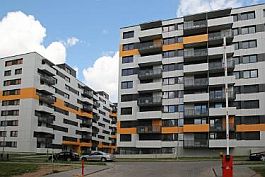Analytics, Lithuania, Real Estate
International Internet Magazine. Baltic States news & analytics
Sunday, 01.03.2026, 21:58
New apartment sales fell only in Lithuania's city Klaipeda
 Print version
Print version |
|---|
"The positions of purchasers' market, which was prevailing during
crisis, are now becoming weaker - more and more negotiating levers occur in
sellers' hands as a result of increasing demand and decreasing supply,"
states Arnoldas Antanavicius,
Manager of Consultations and Analysis Department of Inreal. According to him, the first half-year of 2013 was
characterized by significantly active purchasers. 12,053 of apartment purchase-sale
contracts were signed in Lithuania - by 21 percent more than in the same period
in 2012.
The increase was recorded in new construction apartment segment as well - about 1,400 of new apartments were sold - i.e. 48 percent more that in the first half-year of 2012. During the first half-year the sales of 29 new projects with more that 1,200 apartments were started in Lithuania. In comparison with the corresponding period of the previous year, the amount of new apartments, offered for the market, is twice less, reported LETA/ELTA.
According to Inreal analysts, liquidity of new apartments in Vilnius market almost reached the pre-crisis level - selling off the existing supply would take about 12 months. This rate is almost two times better than a year ago. Housing market in Kaunas has also gained acceleration - the amount of apartments sold in the half-year was 17 percent higher than a year ago. Investments in this segment were increasing - projects, suspended during crisis, are being re-launched. "Coastal resorts have also recorded the increase in new apartment demand: the amount of new construction apartments, sold in Palanga, was higher by two-thirds, while in Neringa - 8 times more than in the first half-year of 2012", states Antanavicius. Only in Klaipeda the sales of new apartments decreased by 20 percent, although the demand of old apartments was increasing.
The increase in transactions in private house and land plot segment was more moderate - in the first half-year of 2013 the amount of registered transactions on purchase-sale of private houses in Lithuania was 5,008 and land plots - 17,070, i.e. respectively, 3.5 percent and 9 percent more than in the first half-year of 2012. The most popular land plots were agricultural land plots, which made up about 72 percent of all transactions.
"Vilnius was prevailing in the commercial real estate segment. In the first half-year of 2013 vacancies in business centres segment in Vilnius decreased from 7.1 to 4.7 percent, lease prices averagely increased by 5 percent," says Antanavicius. According to him, it encouraged the emergence of new projects. At the end of the half-year, in addition to five business centres, currently being under development, which should supplement office market in Vilnius by approximately 40,800 sq. m. of leasehold area, it is expected to start constructions of 3 new business centres with 32,600 sq. m. of leasehold area. The implementation of these projects will lead to the increase in modern office market in Vilnius by a fifth. As regards not so active Kaunas and Klaipeda markets, people continue avoiding investments in this segment. Vacancies in Kaunas decreased from 5.5 to 4.6 percent within the half-year, lease in lower-class office centres averagely increased by 5 percent. In Klaipeda the trends were the worst - vacancies in modern business centres increased from 13.8 to15.9 percent, and the prices remained stable.








 «The Baltic Course» Is Sold and Stays in Business!
«The Baltic Course» Is Sold and Stays in Business!

